Items
topic_interest is exactly
science
-
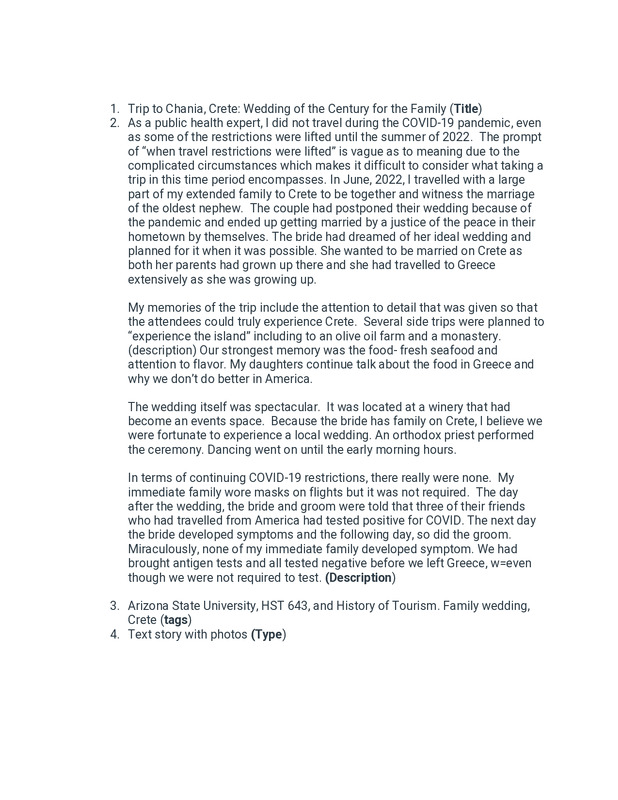 2022-06-12
2022-06-12Trip to Chania, Crete: Wedding of the Century for the Family
This was the first travel for me and my family when COVID-19 restrictions relaxed to a thoughtful degree. This is important to me because it was a time that my extended family came together and the appreciation of that was heightened by the absence of togetherness through out the more critical time of the pandemic. -
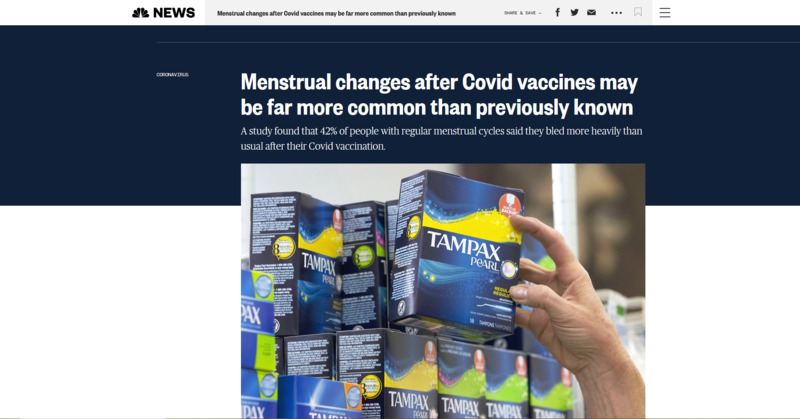 2022-07-15
2022-07-15Menstrual changes after Covid vaccines may be far more common than previously known
This is a news story from NBC News by Sarah Sloat. Since vaccines have been administered for the last year, new information has come out on how they effect the human body. The journal, Science Advances, found 42% of women with regular menstrual cycles bled more heavily after vaccination. 44% said no change occurred, while 14% reported lighter periods. There is no mention on if this side effect has any effect on fertility. -
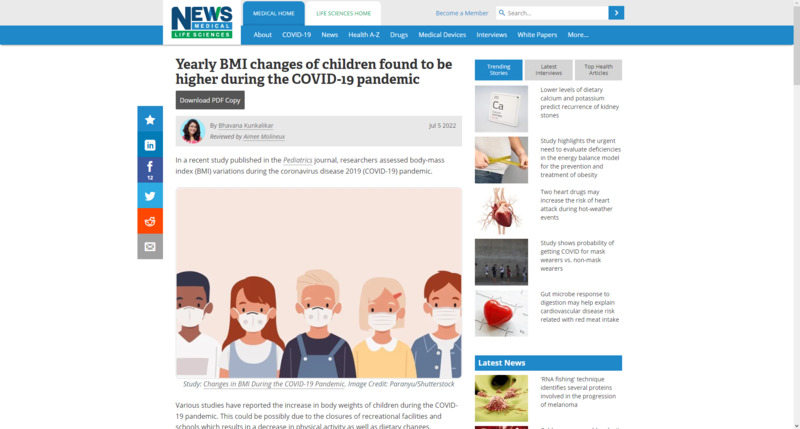 2022-07-05
2022-07-05Yearly BMI changes of children found to be higher during the COVID-19 pandemic
This is a news story from News Medical Life Sciences by Bhavana Kunkalikar. In a study published by the Pediatrics journal, researchers looked at the BMI variations during the COVID-19 pandemic. The study found that compared to the baseline measurements used pre-pandemic, the pandemic showed an increase in BMI that was .24 higher than the baseline. Higher rates of BMI increased in already obese children compared to children of a healthy weight. This article does not mention the social factors that would have contributed to weight gain during the pandemic, but not being able to socialize as often probably was a large contributor. From my own personal experience, I notice some people that I knew prior to the pandemic, and noticed that they put on some weight after the pandemic. Granted, this was what I noticed in adults I knew, not kids. Regardless, I believe that even if someone were to eat the same way they did pre-pandemic, but not exercise like they used to during the pandemic, they are bound to put on a bit of weight from lack of activity. Hopefully, with things being less restricted in some places, it will allow people to do things they did pre-pandemic more often and get back to healthier weights. -
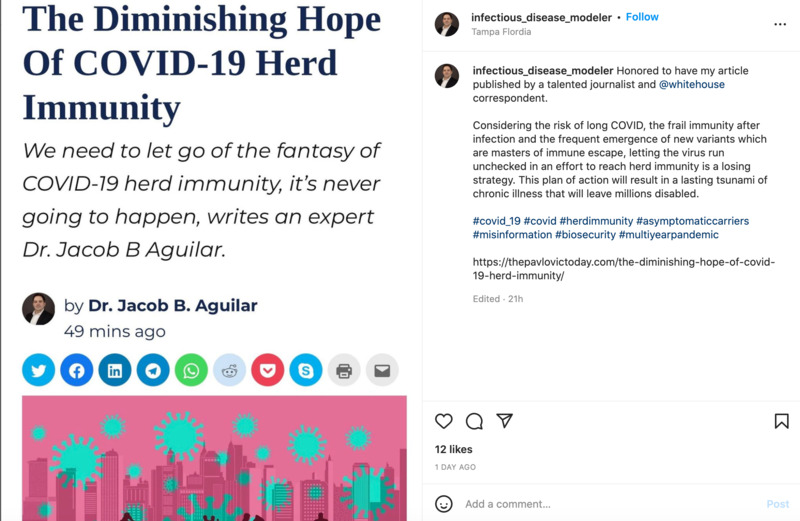 2022-06-16
2022-06-16The Diminishing Hope of COVID-19 Herd Immunity
This is an Instagram post from infectious_disease_modeler (Dr. Jacob B. Aguilar).He wrote an article about how herd immunity doesn't work with COVID as well as it could due to new variants that keep on happening. He says that if vaccines had a 100% effectiveness rates across all situations, this would not really be an issue. Since the vaccines are not entirely effective, the solution, Dr. Aguilar proposes that the way to help mitigate the issue is mass regular testing to slow the spread of new variants. -
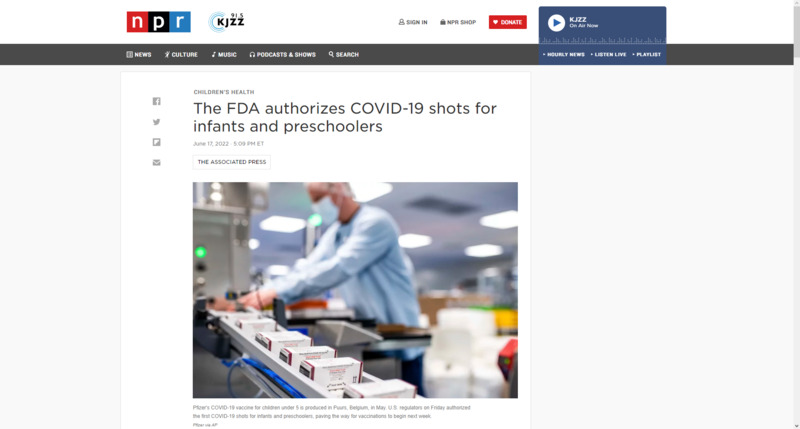 2022-06-17
2022-06-17The FDA authorizes COVID-19 shots for infants and preschoolers
This is a news story from NPR by The Associated Press. The United States has authorized the use of vaccines for infants and preschoolers. The Center for Disease Control and Prevention (CDC) is debating how the vaccines are to be administered. The article says that studies support giving these age groups the vaccines, as they are said to be effective and have minor side-effects. -
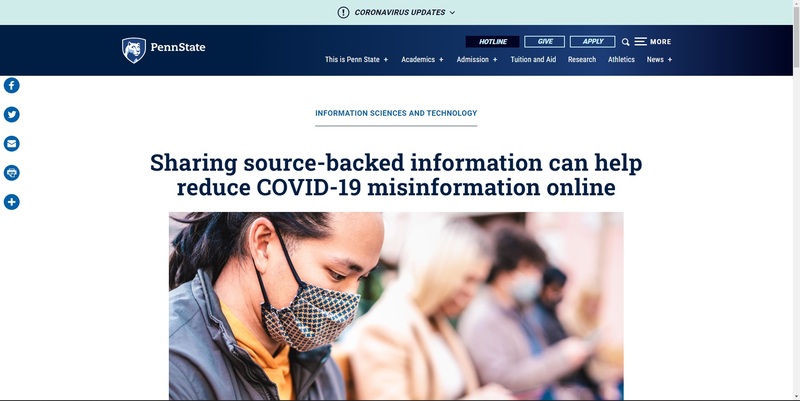 2022-06-09
2022-06-09Sharing source-backed information can help reduce COVID-19 misinformation online
This is a news story from Penn State University by Jessica Hallman. A recent study has shown that user corrections given back and forth on social media has helped reduce the spread of misinformation. Through sharing source-backed information, people were able to pick out fake news easier. -
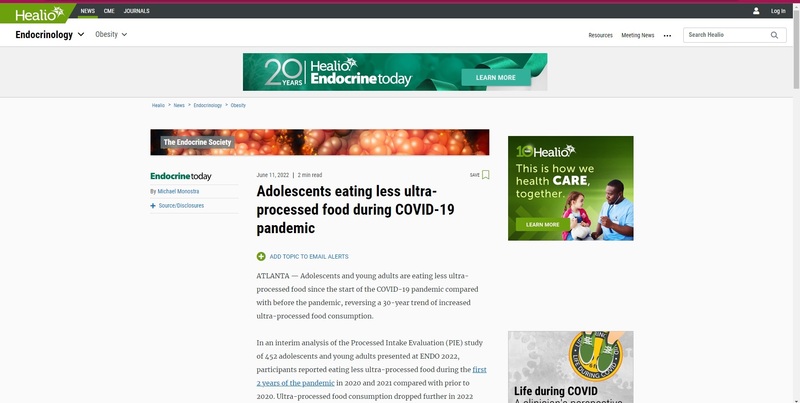 2022-06-11
2022-06-11Adolescents eating less ultra-processed food during COVID-19 pandemic
This is a news story from Healio by Michael Monostra. During the COVID pandemic, adolescents are eating less processed food. "In an interim analysis of the Processed Intake Evaluation (PIE) study of 452 adolescents and young adults presented at ENDO 2022, participants reported eating less ultra-processed food during the first 2 years of the pandemic in 2020 and 2021 compared with prior to 2020. Ultra-processed food consumption dropped further in 2022 when COVID-19 restrictions eased." -
 2022-06-08
2022-06-08Moderna says updated Covid-19 vaccine booster shows stronger antibody response against Omicron
This is a news story from CNN by Jamie Gumbrecht. Moderna believes that their COVID-19 booster is effective against Ominicron, and more effective compared to the normal two doses. The claim is that the booster provided a stronger antibody response than the initial two doses. -
 2022-05-20
2022-05-20What Parents Need to Know About Sharing Breast Milk
This is a news story from The New York Times by Catherine Pearson. Due to the nationwide baby formula shortage, new methods of obtaining milk have come about. One of those ways is sharing extra breast milk. There is some risk involved in getting donor breast milk. Informal sharing means that it won't get checked for things like HIV or hepatitis B. There are some health benefits to using donor milk though. One of them is immunity to COVID. For example, mothers who have been infected with COVID or have received the vaccine can pass down those antibodies to babies through their milk. -
 2022-05-21
2022-05-21Is monkeypox the next big pandemic? Here's why it's not time to panic.
This is a news story from NBC News by Tara C. Smith. This is comparing COVID to the recent monkeypox outbreak. Unlike the COVID, Smith says that monkeypox has had more understanding due to it being related to smallpox. Monkeypox is milder than smallpox and is more difficult to spread compared to something like COVID. However, monkeypox and COVID do have some things in common. One of them is that both are respiratory viruses, meaning that they can be spread through cough, sneeze, and sometimes breathing. One very good thing about monkeypox is that there are already vaccines available that can work against it. The smallpox vaccine is similar enough to monkeypox that it can help prevent both. -
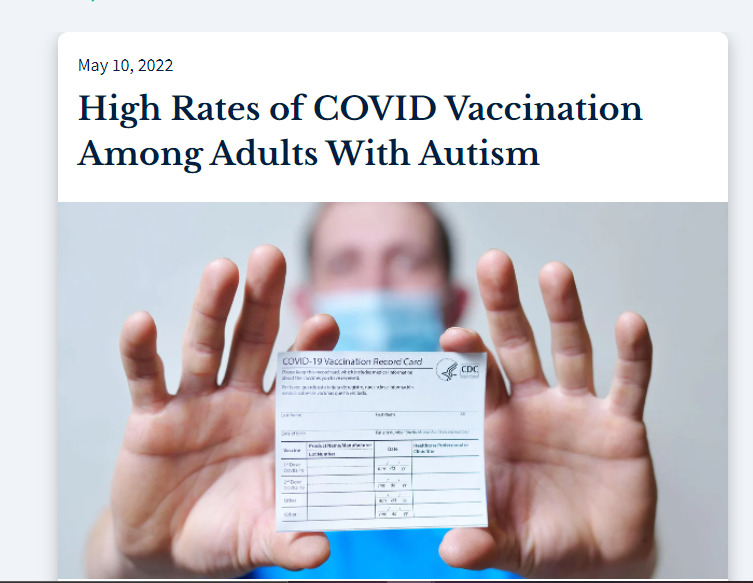 2022-05-10
2022-05-10High Rates of COVID Vaccination Among Adults With Autism
This is a news story from Health Day. Adults with autism have been shown to have higher rates of vaccination according to a new study. Those with autism are more at-risk for severe illness if they contract the disease, say researchers. To get the data, researchers sent online surveys to 431 autistic adults in Pennsylvania. They showed that about 78% of survey respondents said they had received or intended to get a COVID-19 vaccine, and more than 55% said that they had received at least one dose. In comparison, 42% of the overall adult population in Pennsylvania had received at least one dose of a COVID-19 vaccine as of the median response date for the survey (April 2, 2021), according to the study. The findings were published in the journal Vaccine. -
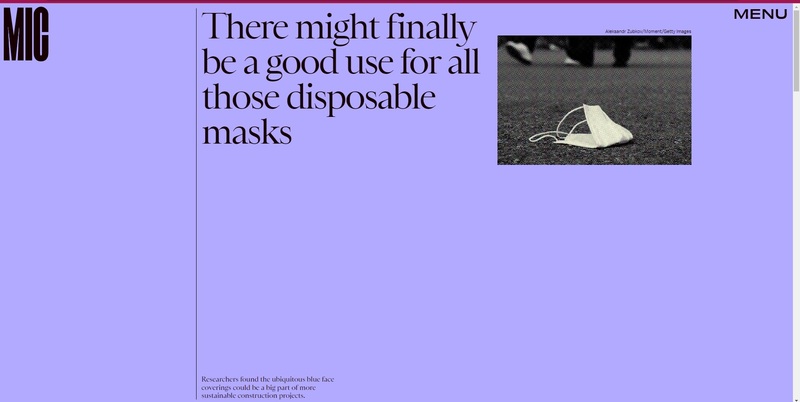 2022-04-28
2022-04-28There might finally be a good use for all those disposable masks
This is a news story from Mic by AJ Dellinger. A new study published in Material Letters has found that disposable masks could be used to help strengthen concrete. The concrete has tested out as 47% stronger than concrete than did not contain traces of masks. The reason it is stronger is due to the microfibers found in masks. Microfibers used in building materials have shown to reduce the amount fo cracks and shrinkage, which can happen within the first 28 days of laying concrete. Using disposable masks in concrete can help reduce mask pollution while making the concrete itself more durable. -
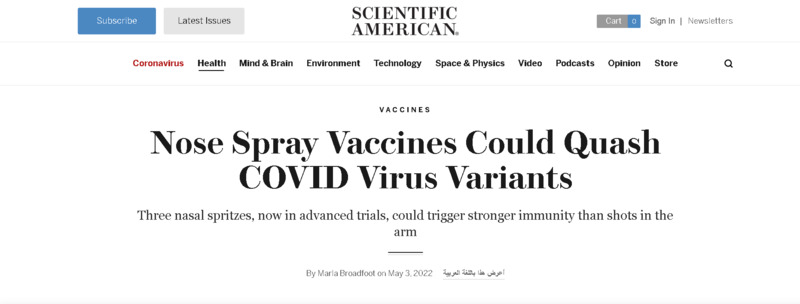 2022-05-03
2022-05-03Nose Spray Vaccines Could Quash COVID Virus Variants
This is a news story from The Scientific American by Marla Broadfoot. With the effectiveness of vaccines waning due to new variants coming about, scientists have been coming up with new ways to combat the virus. Scientists are thinking of developing a nose spray vaccine that attacks the virus at the source. It is believed that a vaccine delivered this method could trigger mucosal immunity. Nasal vaccines have been shown in the past to be more effective than traditional administration of vaccines. There is risk in this, however, because there still needs to be more research done on mucosal immunity. The advantage is that this vaccine does not rely on syringes or needles, so it has the possibility of reaching more people. -
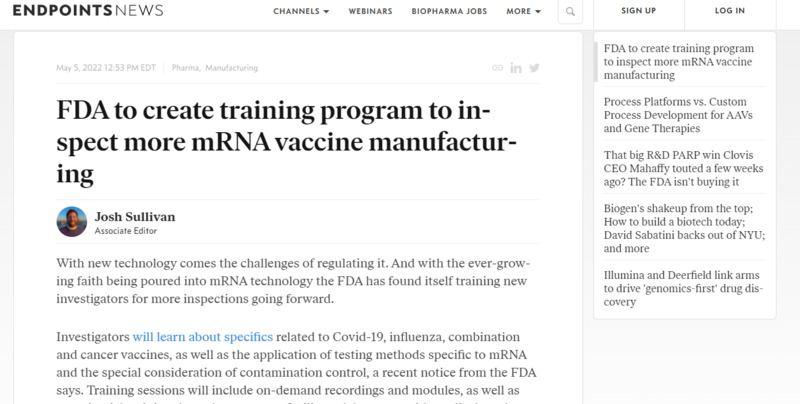 2022-05-05
2022-05-05FDA to create training program to inspect more mRNA vaccine manufacturing
This is a news story from Endpoints News by Josh Sullivan. With new faith being poured into mRNA vaccines, a new training program is being developed to help with the manufacturing process. This program will entail learning the application of mRNA vaccines, as well as laboratory training. BioNTech, Pfizer’s partner in its Covid-19 vaccine efforts, recently revealed that it is paying Matinas BioPharma to gain exclusive access to its lipid nanocrystal drug delivery platform for the oral delivery of mRNA. It also was one of the first companies to announce plans for the massive mRNA manufacturing sites that are being built. BioNTech plans to piggyback off the success of the technology by pivoting to work on malaria vaccines once the Covid-19 pandemic has subsided. -
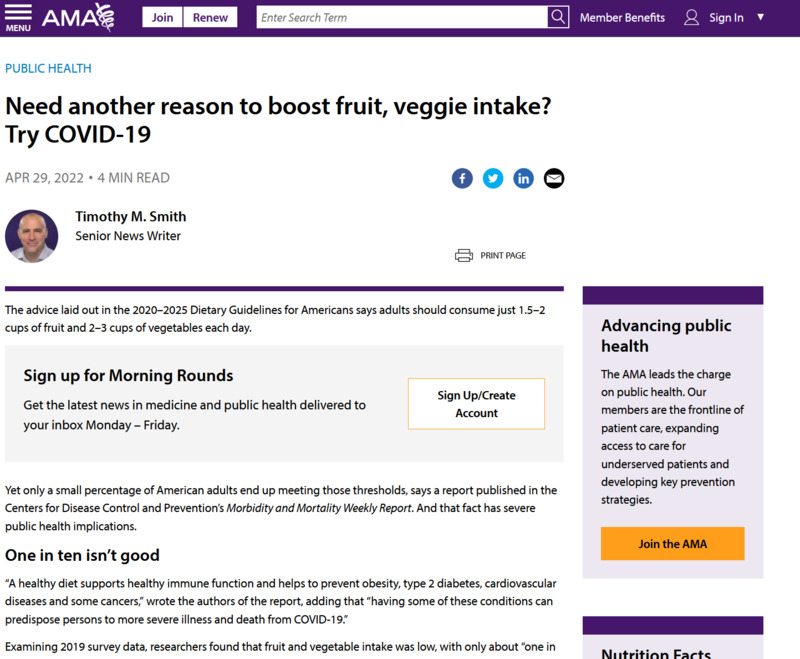 2022-04-29
2022-04-29Need another reason to boost fruit, veggie intake? Try COVID-19
This is a news story from the American Medical Association by Timothy M. Smith. Doctors mentioned in this article bring up the importance of diet and how it relates to fighting off COVID-19. According to a 2019 survey, researchers found only 1 in 10 adults meet the daily recommended intake of fruit and vegetables. There is a racial disparity as well. The researchers also noted that meeting vegetable intake recommendations was highest among those 51 or older. There were also differences in vegetable intake between groups defined by income level and race. While 12.2% of adults in the highest-income households got enough veggies, only 7.7% of those living in middle-income households did. Meanwhile, 6.9% of Black adults met vegetable intake recommendations, compared with 10.1% of white adults. Other barriers in getting the daily recommended intake have class issues, where some groups are more likely to have access to fresh food than other groups. “Perceived barriers to fruit and vegetable consumption include cost, as well as limited availability and access,” the report notes, adding that “for some persons, such barriers might have worsened during the COVID-19 pandemic related to economic and supply chain disruptions that could further limit ability to access healthier foods.” Dr. Kirley said she hopes the pandemic “will draw attention to this longstanding problem and that we’ll start to see more investment in innovative solutions to promote health through better nutrition.” With these things in mind, it demonstrates the barriers some people might have in fighting off COVID. -
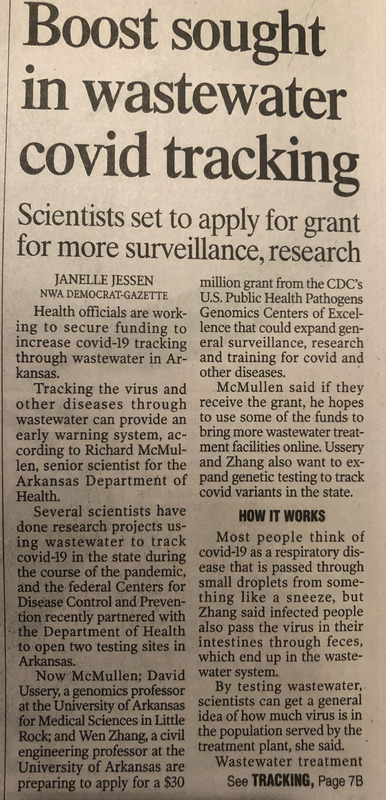 2022-04-10
2022-04-10Boost sought in wastewater covid tracking
This is a news article detailing the work of health officials and scientists and a new program of tracking COVID in wastewater through a program at the University of Arkansas. The Arkansas Department of Health hopes this new program will allow scientists and health officials to receive an early warning about a potential surge in the spread of COVID and take appropriate measures to minimize the potential damage. If successful, the University and the Arkansas Department of Health hope to apply for a $30 million dollar grant from the CDC to implement the process across the country and perform more research. The basic premise is to collect a sample of wastewater and test for COVID-19 and thereby generally derive if the community is increasing or decreasing in cases. While the program cannot give a specific number of afflicted individuals, it is suggested that understanding COVID in wastewater will give health officials a better understanding of those who test at home and therefore do not report on state-wide numbers. This article is fascinating, I think, because it demonstrates a rapid growth in scientific ideas to combat the pandemic since the dawn of COVID in America. Indeed, COVID has permeated every aspect of our lives, so it is only natural to derive a solution from even the most mundane aspects of humanity. It would seem impossible to gain a greater understanding of COVID from something such as wastewater, but the pervasiveness of COVID has encouraged study such as this. I think the ultimate mission of this program is valuable. When I had COVID at the start of February, I took an at home test and therefore I was not reported as a number in the statewide totals. This article really made me think about whether or not we as a society really know how many people are afflicted with COVID and just how serious the pandemic is or not. This article was published in the Northwest Arkansas Democrat Gazette. -
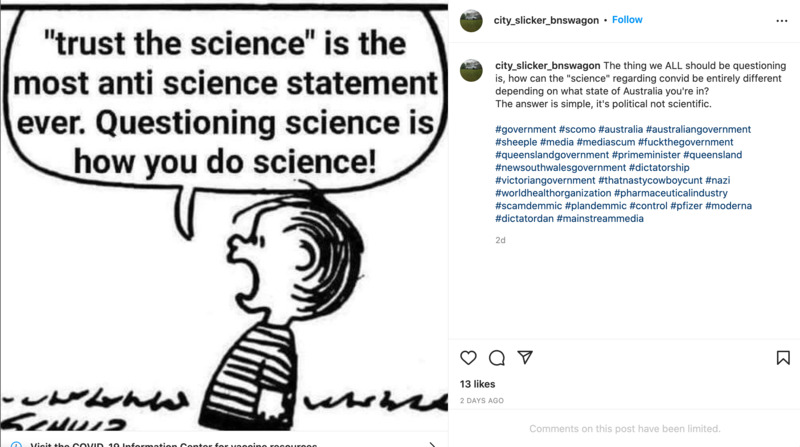 2022-04-20
2022-04-20"Trust the Science" is Anti-Science
This is an Instagram post by city_slicker_bnswagon. This person is questioning the way we think of the science surrounding COVID. This person thinks that the virus is more political than it is about health. -
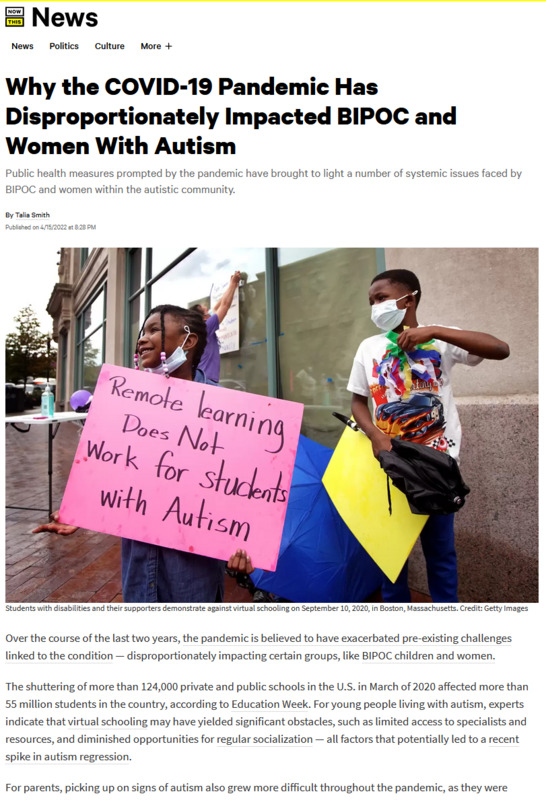 2022-04-15
2022-04-15Why the COVID-19 Pandemic Has Disproportionately Impacted BIPOC and Women With Autism
This is a news story from Now This News by Talia Smith. The author says that over the course of the pandemic, BIPOC and autistic women have been disproportionately affected. BIPOC parents who were not able to work remotely struggled to support their autistic children. One study led by the NIH analyzing the impact of the pandemic on BIPOC and low-income populations shows that families with a child living with autism witnessed an increase in sleep issues and behavioral problems, in addition to increased conflict between children and adults and the use of more severe disciplinary methods. In a study published in “Molecular Autism,” researchers revealed that for adults with autism, the pandemic brought relief from certain stressors like “sensory overload” and ultimately led to an “increase in solidarity.” -
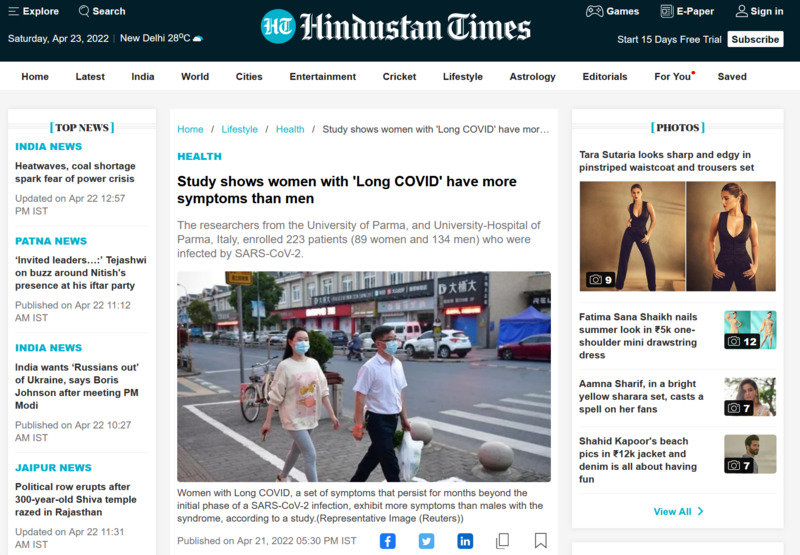 2022-04-21
2022-04-21Study shows women with 'Long COVID' have more symptoms than men
This is a news story from the Hindustan Times. There has been a study showing that women tend to be affected more by 'Long COVID' symptoms than men do. The research was published in the Journal of Women's Health. In the study, women are more likely to have fatigue, difficulty swallowing, and chest pain after a COVID infection compared to men. -
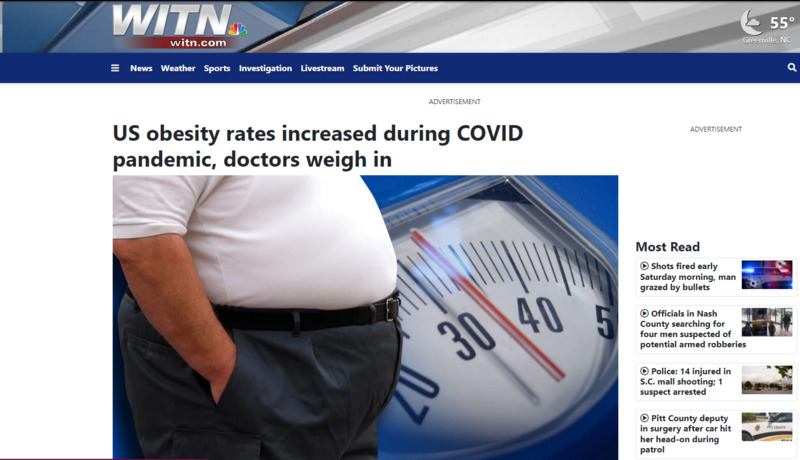 2022-04-05
2022-04-05US obesity rates increased during COVID pandemic, doctors weigh in
This is a text story from WITN by Justin Lundy. This is a news story on the increase in obesity rates since COVID started. In a study published by the American Journal of Preventative Medicine, the average BMI in US adults increased by 0.6% between March 2020 and March 2021. This increase happened even as exercise participation rates increased by 4.4%. -
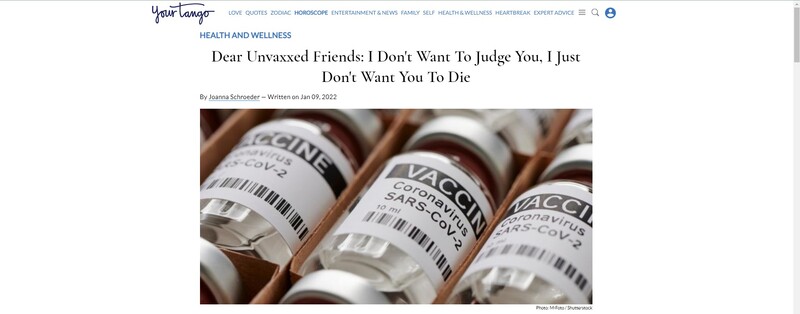 2022-01-09
2022-01-09Dear Unvaxxed Friends: I Don't Want To Judge You, I Just Don't Want You To Die
This is a text story by YourTango, written by Joanna Schroeder. This is a story written from the point-of-view by someone that wants others to be vaccinated. At the beginning, she brings up the feelings of distrust some have towards the government, which has been a big reason why some are refusing to get vaccinated. The author then mentions that she has been seeing an increase in patients with heart problems in the pediatric section of hospitals, with some of those cases being due to COVID. Continuing on with this point, the author mentions a peds cardiologist she has been in contact with, and the cardiologist says that there has been an increase in myocarditis cases due to COVID. Later, she says that her left-leaning friends are receptive to data like this, but her right-leaning friends are not. She then pleads that she does not want her unvaccinated friends to die, and that they have a greater chance of getting hospitalized compared to those that are vaccinated. Finally, she ends by saying to not let policies get in the way of good judgement, saying that she is tired of misinformation coming from both sides. -
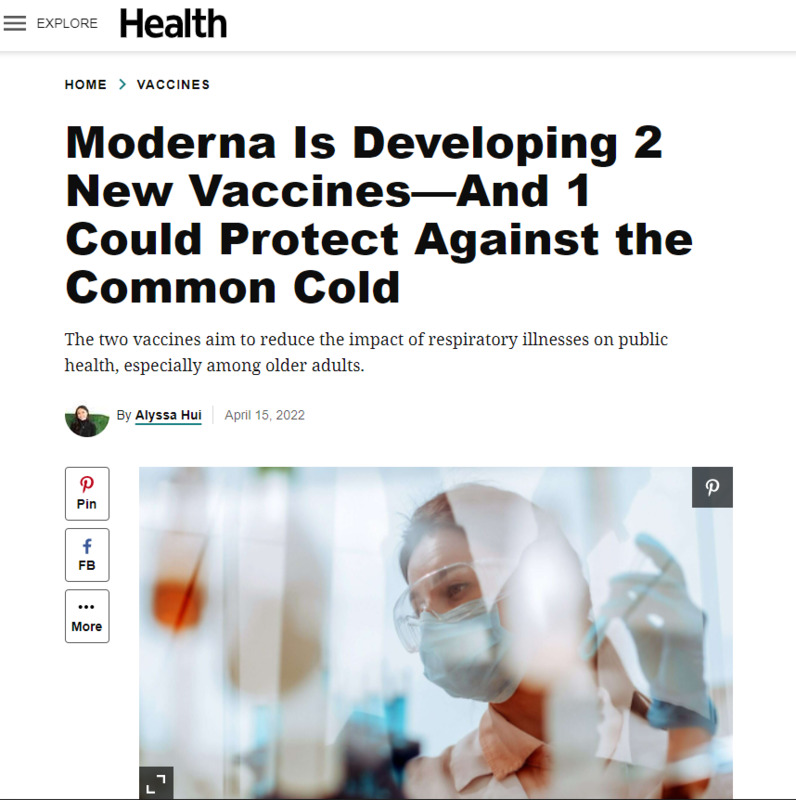 2022-04-15
2022-04-15Moderna is Developing Two New Vaccines-- And One Could Protect Against the Common Cold
This is a news story by health.com written by Alyssa Hui. This story is about Moderna expanding its biotechnology into creating new vaccines using similar techniques the COVID vaccines have used. One of these vaccines will be used to help combat RSV, which is a virus that hospitalizes an average of 177,000 adults per year, according to the CDC. Another illness that Moderna is looking to use vaccines against are four other endemic human coronaviruses. Moderna does not claim they offer 100% guaranteed protection, but that they can benefit people greatly for reducing chances of contracting certain illnesses. Moderna wants to ensure that the vaccines are safe and will go through testing procedures to do so. They are hoping that there will be more uses for mRNA style vaccines in the future, and not just for the coronavirus. -
 2022-04-11
2022-04-11A New Stanford Study
This is an Instagram post by newsrescue, which is a news site that claims to bust "fake news." The study that this news story is referring to is one on spike proteins, which found that the vaccinated and unvaccinated had roughly the same amount of spike proteins in their blood. This news story is designed to show that the vaccines may not be as effective as they are claimed to be. -
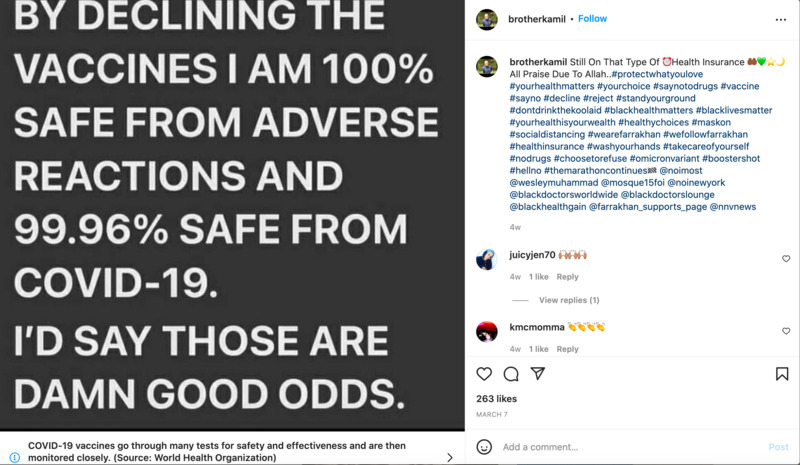 2022-03-07
2022-03-07Decline the Vaccine
This is an Instagram post from brotherkamil. This user is posting their skepticism surrounding the vaccine, believing that it will cause ill health effects. By abstaining from the vaccine, the user says that they are 100% safe from averse reactions. -
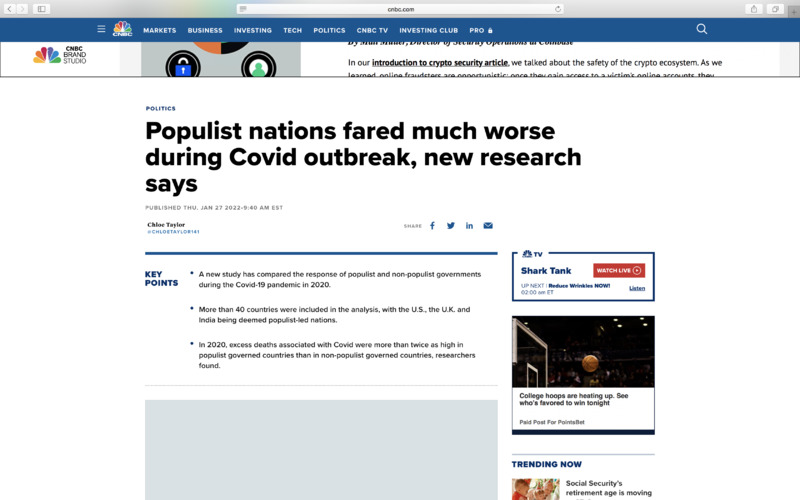 2022-01-27
2022-01-27Populist nations fared much worse during Covid outbreak, new research says
This is a news story from CNBC, written by Chloe Taylor. This is a story about a study that came out about how well populist nations fared under COVID-19 compared to other nations around the world. More than 40 countries were included in this study, with the US, UK, and India being considered populist nations at the time that this was conducted. In 2020, the study claims that excess deaths were more than twice as high for populist ran governments. For comparison, the countries that were not considered populist in this study include Canada, Sweden, and Japan. For every 100 COVID related deaths, non-populist countries had an additional 8 deaths. In populist led countries, it was an additional 18 deaths for every 100 deaths. The study attributes this to higher citizen mobility that was allowed in populist nations, leading to more spread of the virus. It also claims that populist governments downplayed the severity of the virus itself, giving people the impression that things were safer than they actually were. -
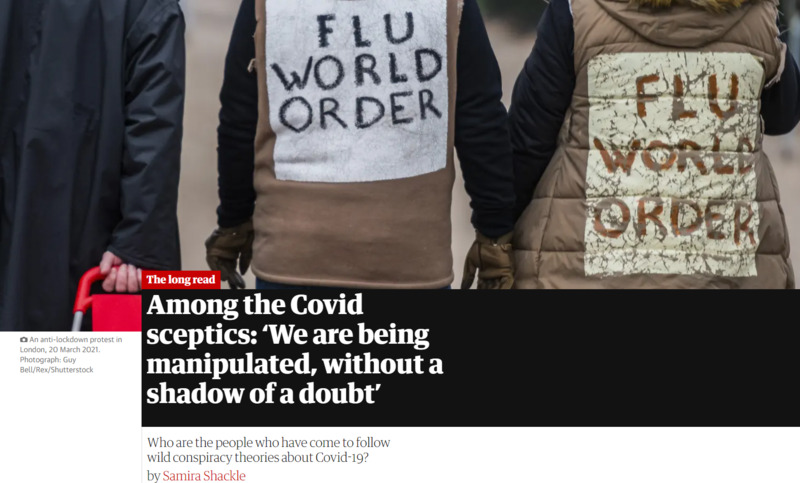 2021-04-08
2021-04-08Did COVID doubters' perspective get lumped in with deniers?
I believe we all know someone during the worst days of the pandemic who doubted that it was as serious as it really was. Perhaps they willingly discussed their perspective, reluctantly talked about it if pressed, or just did not even want to talk about it. I am not talking about the people seen in the attached article that were out protesting masks or vaccines, pushing conspiracy theories on 5G and Bill Gates' love of vaccines. I am thinking of the people we work with, are friends with, or very likely are in our families that just really just wanted life back to normal and did not think the global reaction was justified. A casual search of the internet for the perspectives of COVID doubters, or those who thought that the reaction to the pandemic was over-the-top, immediately sends you to articles and stories about the horrors and idiocy of the COVID deniers who pushed crazy theories about world dominance. Wouldn't it be nice to understand how the middle ground of the pandemic felt, lived, and reacted to the reality of the pandemic, if at all? We owe it to future generations to not only highlight the worst in the deniers, as seen in the attached article, but to also illustrate the everyday people who just were not sure who to believe, fake news or science. One thing is for sure, it is not fair to lump everyone in the middle into the far right. I would like to hear the stories of people who doubtfully lived in the pandemic, their trials, frustrations, and tribulations and if they had any change of heart or ideals. Their perspective will give a further understanding of the sociological impact of the pandemic. -
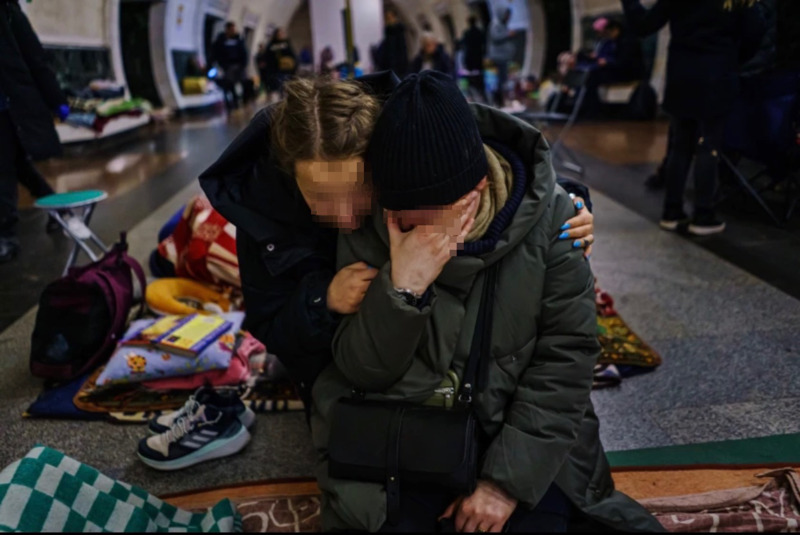 2022-03-26
2022-03-26Russia spread anti-vax lies in Ukraine. Will it cause a COVID crisis for Europe?
This is a news story from the Los Angeles Times by Melissa Healy and Emily Baumgaertner. The authors claim that even prior to Russia's invasion of Ukraine that Russia has been working to undermine the confidence of Western vaccines. It says that these messages were encouraged by President Vladimir Putin and shown on Russian TV and social media. In Ukraine, only 35% of residents are fully vaccinated, some of the lowest in all of Europe. This makes the refugee crisis in Ukraine more dire, as people needing to leave will risk spreading COVID more places. The authors assert that with the low vaccination rates of Ukrainian refugees that it will cause another surge in COVID cases throughout Europe. The CDC has advised countries accepting refugees to offer them the vaccine upon entry. This article details that this is not the only vaccine that Ukrainians have not accepted as much compared to the rest of Europe. In 2021, only 53% of Ukrainian babies were vaccinated against polio. That number has now risen to 76% of infants being immunized against polio. Though, the likelihood of these diseases spreading as far as COVID are fairly low. The vaccine hesitancy, the authors say, is rooted in deep distrust of the government. In December 2020, only 14% of Ukrainians reported having trust in their government in a poll. -
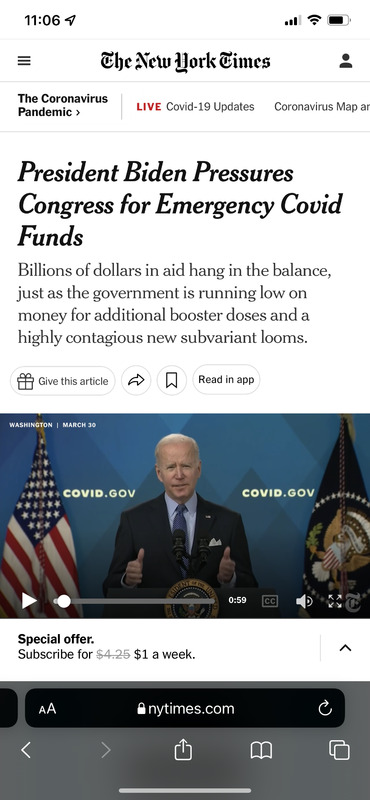 2022-03-30
2022-03-30President Biden Pressures Congress for Emergency COVID funds
This is a news story written by Sheryl Gay Stolberg, Emily Cochrane and Noah Weiland for the New York Times. The article writes of how President Biden believes this is not a partisan issue, but a matter of health. President Biden is said to have received his second COVID booster prior to making this announcement. Another aspect this story brings up is how BA. 2, a new COVID variant, has made itself known, raising concerns for once it gets to the United States. President Biden has made it known that as these new variants pop up, we will be in our "Next Normal", where masks and other such requirements will be used when needed. In other words, there is no real "end" to the pandemic. -
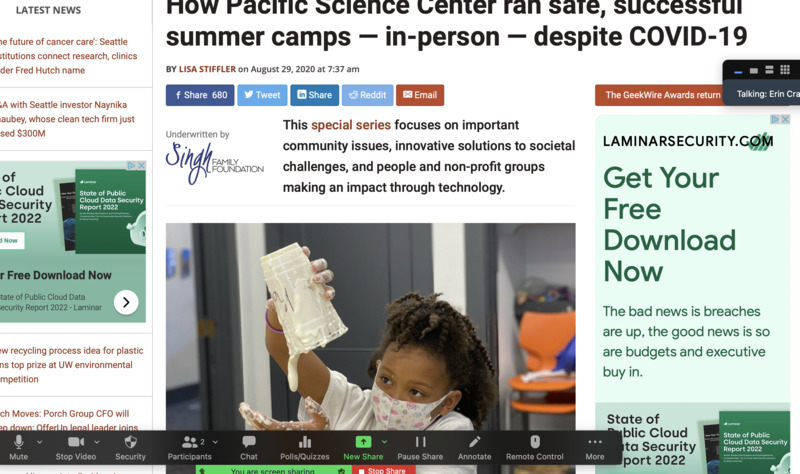 2020-08-29
2020-08-29Socially distanced and socially safe summer camp
The attached article is something that is probably not well known. In Seattle, Washington there is the Pacific Science Museum, a fun educational museum for all ages, but focused on kids. Every summer they run educational camps for K-8 graders. It was unclear if after months of distance learning (early pandemic, 2020) students would be physically or emotionally ready to do a group activity in person. PacSci’s camps were able to run while students were socially distanced and masked. This matters because there has been a lot of rhetoric about kids not being able to wear masks for a variety of reasons, but this article proves that kids were able to understand social distancing and mask-wearing so they could have a safe and fun thing to do. With these practices in place, combined with low group sizes, and the use of a lot of outdoor time, they didn’t have any transmission cases for the whole summer. Not included in the article but they had the same success the next summer, 2021, and are on track to continue again the summer of 2022. The significance is not just to a collection focused on children, but also to the service industry since this is a less formal education setting that leans more toward front-facing customer service. -
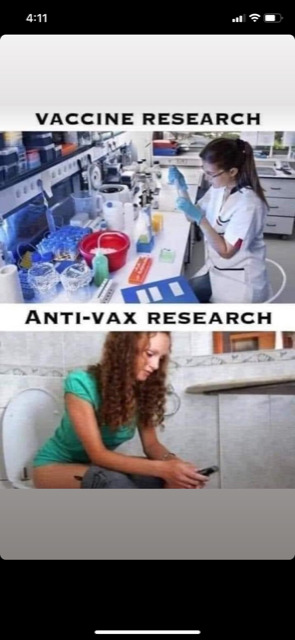 2021-08-10
2021-08-10COVID meme
I think what makes Covid memes so funny is that they are sometimes based on truth... -
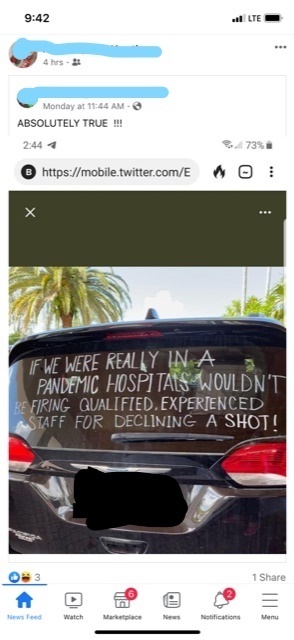 2021-08-11
2021-08-11If it isn't one thing its another
I have never realized how different my friends on social media are. Growing up in Los Angeles I have many friends who are all politically and socially like-minded. My husband joined the military and then my social media was flooded with the opposite from my "liberal" friends. The differences of opinions never bothered me and hardly ever showed themselves until Trump became president. It's funny how Trump ignited a flame in so many people. Today with politics fueling everything I still see that clear distinction between my friend groups. The saddest part about the pandemic is seeing how science has been "canceled" and political views have somehow replaced common sense. Because so many Democrats are urging people to get vaccinated it seems like Republicans must refuse. I see posts like the one pictured all the time. There's always a reason to refuse common sense. First, it was because COVID wasn't real, then it was because their right to contract covid was being infringed on. I heard some say robots were being implanted, that the government was running experiments on willing democrats. When the death rate continued to rise, they said the numbers were made up. Today it seems like most covid deniers are claiming that if COVID was real essential workers would not be required to be protected against it. I will never understand their reasoning. -
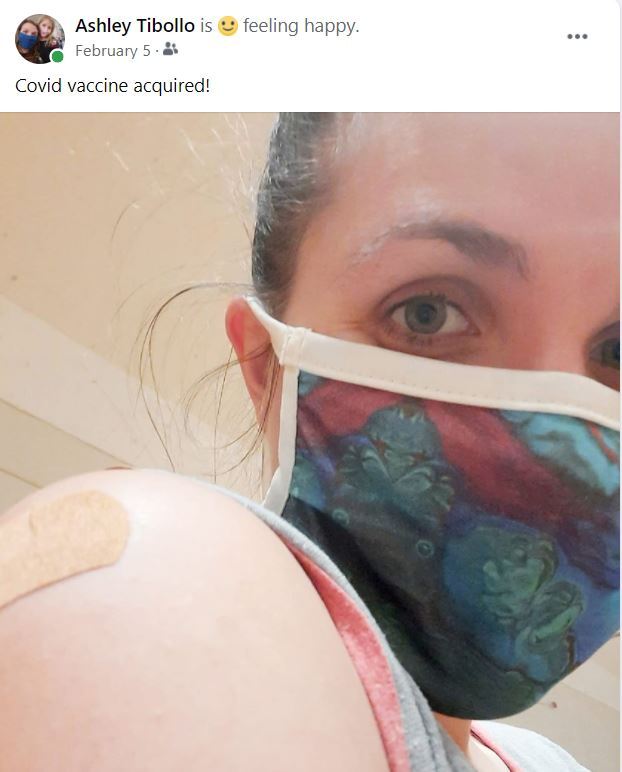 2021-06-03
2021-06-03My Covid Vaccine Experience
These are the two Facebook posts I made the day I got my first shot and my second. I received the Moderna vaccine. As a teacher, I was able to get mine sooner than many others. Many people I know had (and still have) reservations about getting the vaccine. I believe in science. I believe in vaccines. It is disheartening and dangerous to see so many Americans throwing away an opportunity to protect themselves, their families, and their community because of politics. Science should not be political. The vaccine did make me feel ill, especially the second one, but it was temporary. I would do it a hundred more times if I had to. A friend of the family said they would not get the vaccine because, "What's in it for me? Even if I get Covid, I am young and healthy, unlikely to die." I found that statement alarmingly self-centered. Getting the vaccine isn't about you as individual as much as it is about you protecting your community and the world. As the saying goes nowadays, "Until all of us are safe, none of us is safe." -
 2021-03-27
2021-03-27Fox News Perspective
Living in a divided nation I felt it necessary to follow various news outlets. I've realized that many times the truth usually lies somewhere in the middle. Actually, I think the truth usually lies somewhere closer to the left side but that's beside the point. I found this post by Fox News to be interesting because it talks about how conservative TV Host Laura Ingram thinks history will be written. I rarely agree with anything Fox News posts but in this case, I agree that history will record the many villains that have been exposed during the pandemic. I agree that many special interests bodies will be listed but I don't think it will include teachers. I don't think it's farfetched to say that the conservative's push to return back to school has more to do with money and less to do with children. It's funny how she says it's time to "follow the science" where were these conservatives when science said masks help stop the spread of COVID? -
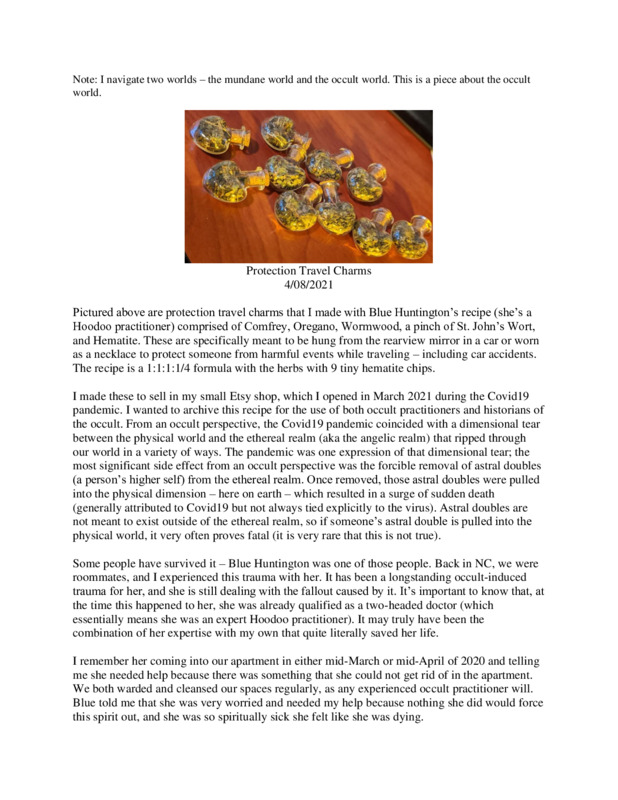 2021-04-08
2021-04-08Covid19 and the Occult
The occult experience of Covid19, from my perspective as an adept occultist. -
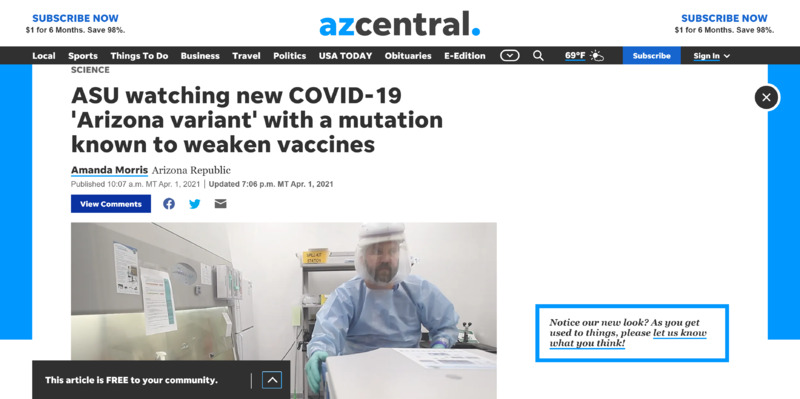 2021-04-01
2021-04-01News Article: ASU watching new COVID-19 'Arizona variant' with a mutation known to weaken vaccines
By Amanda Morris of the Arizona Republic: Arizona State University researchers have found a home-grown variant of the coronavirus emerging in Arizona that they say should be monitored closely because it carries a mutation known for weakening vaccines. In a non-peer reviewed study that published Sunday, researchers said they have detected 17 cases of the new variant since February, 15 of which were in Arizona. The other two cases were found in Houston in late February and New Mexico in early March, suggesting that the variant has begun to spread. "My hope is that we do not see more of these cases. The whole point of surveillance is to keep this from spreading," said Dr. Efrem Lim, an ASU virologist and assistant professor. The variant is known as the B.1.243.1 variant, and descends from a common lineage of the virus called B.1.243, which nationally makes up about 2.5% of all cases, according to David Engelthaler, director of the Translational Genomics Research Institute's infectious disease division in Flagstaff. "It's not dominant. But, there's a fair amount of that lineage that has been able to hang around," Engelthaler said. "It seems to have picked up this E484K mutation, what we call the 'eek!'" This E484K mutation has also been seen in the variants first detected in South Africa and Brazil, as well as one new variant recently discovered in New York. Numerous studies have shown that this mutation — located in the spike of the virus — lowers antibody responses to the virus and could weaken vaccines. Antibodies are one of the body's tool to recognize and fight the virus. The E484K mutation has been shown to weaken antibody responses. One study from Seattle showed that it caused the neutralizing effects of antibodies to decrease by tenfold, and numerous other studies have shown similar results. American vaccine development company Novavax reported that its COVID-19 vaccine was 96.4% effective against the original coronavirus strain and 86.3% effective against the U.K. variant, but was far less effective in South Africa, where the South Africa variant carrying this mutation is dominant. In the South Africa trials, the vaccine was shown to be 48.6% effective overall, and 55.4% effective in HIV-negative individuals. Moderna announced a sixfold reduction in antibody responses from its vaccine against the South Africa variant, and Pfizer observed a drop in vaccine-induced antibody responses against the South Africa variant. The Johnson & Johnson vaccine is reported to be 64% effective against moderate to severe COVID-19 in trials in South Africa vs. 72% effective in U.S. trials. Though the E484K mutation appears to reduce antibody response and possibly reduce vaccine efficacy, Lim stressed that vaccines still work well and said people should get their vaccines as planned. Scientists are monitoring mutations in the spike of the novel coronavirus. Community spread is a concern Though the new Arizona variant carries this mutation, it's still possible for the variant to fizzle out and stop spreading. Lim said researchers have found two other cases where viruses within the B.1.243 lineage independently picked up the E484K mutation, but did not spread. "In both cases, they never led to more transmissions," Lim said. Engelthaler has also tracked other lineages where the E484K mutation showed up, but those strains fizzled out. Overall, researchers have detected over 60 samples containing the E484K mutation statewide, according to TGen's Arizona COVID-19 sequencing dashboard. In order to continue spread, Engelthaler said variants need to be very "fit." "This mutation has popped up on multiple instances and then just goes away," he said. "This one mutation by itself doesn't give the virus superpowers." "It’s definitely a mutation of concern but time will tell if it will be a variant of concern," he added. If the mutation shows up in a more fit version of the virus, then Engelthaler said it becomes more of a concern. The new variant in Arizona is different than past cases because it has already spread from one person to another and could spread further, according to Lim. He said "one-off" mutations here and there are normal, but that the bigger question is about the transmission levels of this variant. A variant's ability to spread to others is also dependent on human behavior, Lim said. If people follow public health guidelines, they are less likely to spread variants to others. In total, Lim said the new Arizona variant has 11 mutations, which is "quite a bit more" than normal virus variations. These 11 mutations could be helping the virus survive or spread and could also act as a "fingerprint" to help researchers identify the new variant, Lim said. Another one of the 11 mutations is located in the spike that the virus uses to attach to and infect cells. Engelthaler said that because of the importance of the spike, any mutations in that area could affect things like how fast the virus spreads or how severe the related illness is. Both Lim and Engelthaler said it's too soon to tell whether the other mutations in this variant have any effect. Overall, this variant still seems to account for a very low percentage of overall cases in the state, according to Dr. Joshua LaBaer, the executive director of ASU's Biodesign Institute. ASU researchers wrote that it's still possible there are more undetected cases of the variant since there are limited efforts to genetically monitor the virus nationwide. In Arizona, roughly 1.3% of cases overall have been genetically sequenced, or analyzed, according to TGen's Arizona COVID-19 sequencing dashboard. In February and March, over 3% of cases were sequenced, higher than national rates of sequencing, which were below 1% in January. ASU is working with the Arizona Department of Health Services to monitor the new variant and hopefully prevent further spread through contact tracing and other public health measures, Lim said. California and UK variant cases rise Currently the Arizona variant is only considered a "variant of interest" and not a "variant of concern." These are different categories outlined by the CDC and used to assess the risk level of each variant. The CDC defines "variants of interest" as those that are associated with potential changes, whereas "variants of concern" have evidence showing actual changes such as increased transmission, more severe disease or antibody evasion. There are five variants of concern, which include variants first identified in the United Kingdom, South Africa, Brazil and California. Two variants from California were elevated from variant of interest to variant of concern this month and have rapidly spread in Arizona. "They're closely related to each other and have definitely been documented with increased transmissibility and some impact on some antibody treatment," Engelthaler said. In November 2020, both the California variants accounted for only 0.73% of Arizona's genetically sequenced samples. By March, they accounted for 31.64% of samples and are predominant variants statewide. One non-peer reviewed study from the University of California San Francisco showed weaker antibody responses against the California variants. Because of concerns that monoclonal antibody treatments may be less effective against these two variants, the U.S. Department of Health and Human Services announced two weeks ago that it would limit the distribution of one treatment to states with high levels of the California variant, including Arizona. The California Department of Public Health also recommended that the state stop distributing the treatment, which is made by American pharmaceutical company Eli & Lily. In a health alert, the department said this treatment was unlikely to be active against the California variants. The U.K. variant, which is highly contagious, has also been spreading statewide ever since it was first detected in late January. In March the U.K. variant accounted for 4.72% of genetically analyzed samples. Currently, Engelthaler said Arizona has over 100 cases of the U.K. variant and over 1,000 cases of the California variants. Arizona also detected its first cases of the South Africa variant last week. So far, Lim said that all of the variants of concern are manageable and have not risen to the level of "variant of high consequence," which the CDC defines as variants that are shown to significantly reduce the effectiveness of prevention and medical measures. "The risk is whether one of these current variants of concern acquire additional mutations that push it up to the next level," Lim said. To prevent further mutations, LaBaer said it's important to prevent spread of the virus by continuing to follow health guidelines and getting vaccinated. The more the community can prevent the spread of the virus, the less mutations will occur, he said. "We're kind of in this race right now between the developed dominance of these much more infectious variants that are now spreading throughout the country and getting people vaccinated," LaBaer said. "At the moment, I'm a little worried that the spread of this virus is so fast that that may outpace our ability to get vaccines in arms." He said it was theoretically possible that new variants could escape the vaccines, meaning that the public would move backward away from reaching herd immunity. But Lim said the vaccines can easily be updated to protect against new variants. Pharmaceutical companies like Pfizer and Moderna are already working on developing updated booster shots. In the meantime, researchers will continue to monitor the Arizona variant to see if it spreads further. Engelthaler said he expects the most fit variants of the virus to become more dominant statewide as people continue to get vaccinated and stamp out less successful strains. "There's a bit of a race here with the virus — a survival of the fittest race," Engelthaler said. "But what we don't want is to raise too much concern that things are going in the wrong direction...what we're doing is closely watching the evolution of a virus like we never have before. It's good that we have this capability, it's more important to put it into context." Amanda Morris covers all things bioscience, which includes health care, technology, new research and the environment. Send her tips, story ideas, or dog memes at amorris@gannett.com and follow her on Twitter @amandamomorris for the latest bioscience updates. Independent coverage of bioscience in Arizona is supported by a grant from the Flinn Foundation. -
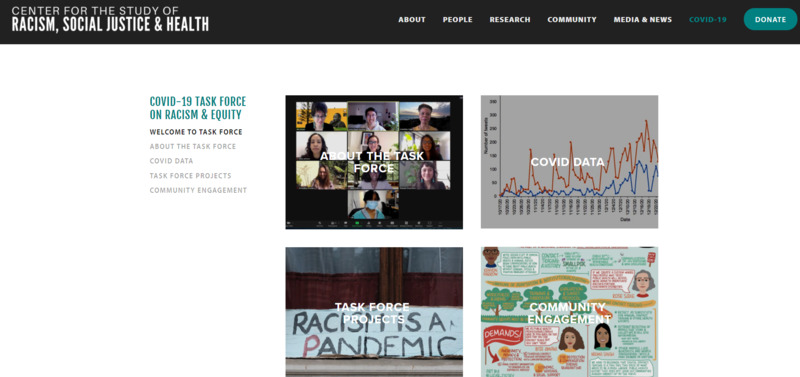 2021
2021Center for the Study of Racism, Social Justice & Health
COVID-19 TASK FORCE ON RACISM & EQUITY. The site looks at the science and humanity behind the Covid-19 Pandemic through a social justice lens. -
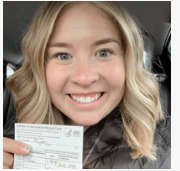 2021-02-05
2021-02-05Keena Covid Vaccine Booster
I got my vaccine booster on Friday, February 5th, at 4 pm. I was very excited to return to the local hospital for this vaccine appointment. On February 1st, tier 2 had opened, and vaccines were now being offered to anyone over 65. The hospital had really stepped up their game and was administering about 20 vaccines every 4 minutes (I asked), and they were so efficient! I got my second dose and then sat waiting in the lobby for 15 minutes. While I was waiting, there was a woman behind me (older than 65) who had just gotten her first dose. She was scheduling her appointment for her booster and struck up a conversation. She told me that she was so sad that so many people were dying, and she was excited to get the vaccine. She also mentioned that since her husband had died and she was no longer able to drive, she took a cab for the 45-minute drive to the hospital. She didn't care what the cost was - she wanted the vaccine. It was really quite sweet. After my shot at, 4 pm my husband and I went to our friend's home for our usual Friday night take out dinner. Around 10 pm, while we were still at our friend's home my ankles, knees, and hips began to get unusually sore. We left shortly after, and I was uncomfortable the entire car ride home. When we finally got home, I went straight to bed. At 6 am, I woke up with a splitting headache, body aches, and chills. I got myself out of bed to go to the bathroom (about 3 steps away) and immediately felt nauseous. I returned to bed, woke up my husband, and asked for water, Tylenol, and a heating pad. After taking Tylenol, I fell asleep for about 1 1/2 hours. Again, I woke up with a splitting headache and body aches but couldn't take any more pain relievers. I just laid in bed trying to get some rest and ordered Chick Fil A breakfast; I'm not sure why but that's what I was craving. I got out of bed to eat breakfast and promptly returned to bed. I took more Tylenol at 10 am and fell asleep for another hour and a half. When I woke up shortly before noon, I took a bath to calm down my body aches. My wrists and my shoulders/armpits hurt the worst. I stayed in the bath for about 30 minutes, which is a lot for me because I honestly cannot remember the last time I took a bath - I think they're gross. After that, I moved out to the couch, took more Tylenol, and watched a movie. When the movie ended, I went back to bed. I slept from about 3 pm to 5 pm. When I woke up, I took more Tylenol, moved to the couch, and watched another movie while my husband made dinner. I had some dinner and stayed on the couch until 10 pm. While the Tylenol helped with the body aches for about an hour, nothing seemed to touch my headache. I was using a heating pad on my neck and doing some yoga to try and stretch it. I went to bed with my usual nighttime routine and fell asleep around 10:30 pm. I didn't wake up at all overnight. I woke up on Sunday at 8 AM feeling AMAZING. It was like I had never reacted at all. My arm is not sore; I have no body aches and no headache. My husband is a third-year med student and spent most of Saturday looking at me like a science experiment because my body was reacting to the vaccine exactly like it was supposed to. Through all of the pain on Saturday, I was silently cheering on my body for doing its job because I knew that meant it was working. Through the entire pandemic, I was able to remain Covid free (as far as I know), and I would certainly take 1 day of vaccine induced pain over 7 days of Covid. -
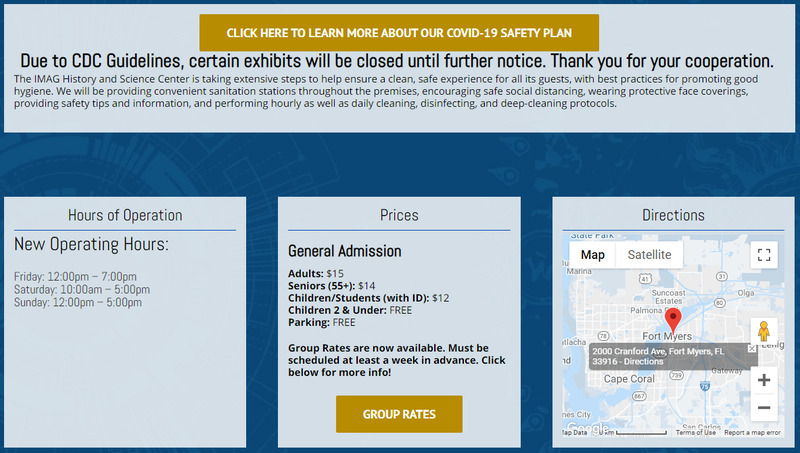 2020-11-02
2020-11-02IMAG History & Science Center COVID-19 Changes
Fort Myers IMAG History & Science Center new hours and exhibit closure web page for COVID-19. There are new hours, groups must register at least a week in advance, and there are exhibits that are remaining closed until further notice. -
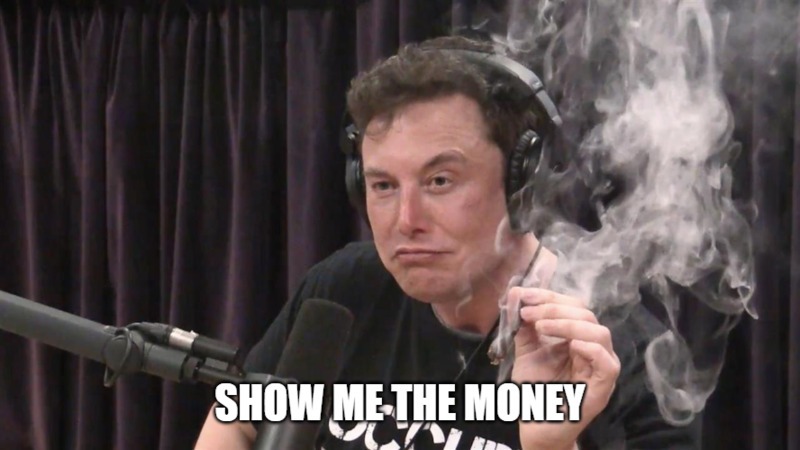 2020-04-05
2020-04-05Corporate Growth
This is a photo of Elon Musk smoking marijuana on the Joe Rogan Experience podcast, captioned with the phrase “show me the money.” This is a reference to the astronomical growth of the Tesla Corporation in 2020 and the average investor’s potential to secure massive gains, as well as a joking reference to the near worship of Elon Musk that can be found in the subreddit ‘WallStreetBets.’ This subreddit often features ‘absolute madlads’ making huge gambles on stocks (usually TSLA, AAPL, or AMZN) and subsequently either securing massive returns tallying into the hundreds of thousands or losing everything. When most of my family was laid off from their jobs, my brother and I turned to day trading to keep ourselves and our family afloat. I was one of the only ones still employed at the time, and I was doing this in addition to working up to 75 hours a week to take advantage of overtime pay stacked on top of hazard pay. Although only my father and I were still working, everyone in the family still had bills to pay and the rent was still due. Tesla’s stock, specifically, has grown almost 500% this year and is set to grow even more. This meme is somewhat of an inside joke my brother and I had as we began securing leverage and buying covered calls on TSLA to increase our overall cash flow with the little savings we had to work with. We were quite literally counting on Elon Musk and his revolutionary car company that we had placed our faith in during this time to pay our rent. Luckily, it worked out for us. Ironically, the massive transfer of wealth to corporations from small businesses that went under as a result of COVID-19 was incredibly beneficial for my family and I since we invested in the right stocks at the right time. -
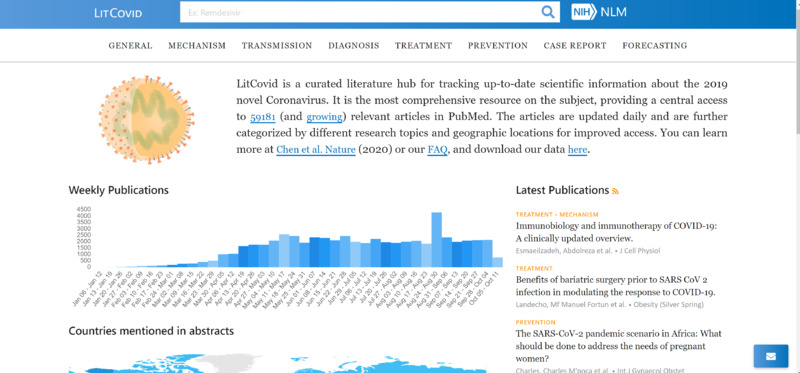 2020-10-08
2020-10-08LitCovid- open access database to new and peer reviewed literature
LitCovid is a website created by the NIH to provide free access to all academic papers and studies published to PubMed about COVID-19. The database makes it easy to search for specific types of studies, and is broken down into different categories (such as mechanism, transmission, prevention, and forecasting). It is quite jargon-heavy since it is a collection of academic papers, but can be really useful for learning more about the disease. -
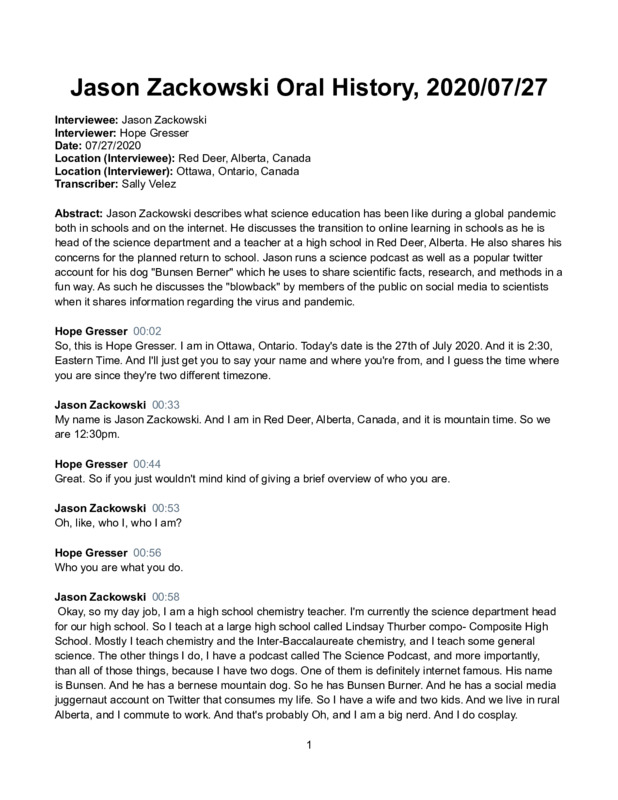 07/27/2020
07/27/2020Jason Zackowski Oral History, 2020/07/27
Jason Zackowski describes what science education has been like during a global pandemic both in schools and on the internet. He discusses the transition to online learning in schools as he is head of the science department and a teacher at a high school in Red Deer, Alberta. He also shares his concerns for the planned return to school. Jason runs a science podcast as well as a popular twitter account for his dog "Bunsen Berner" which he uses to share scientific facts, research, and methods in a fun way. As such he discusses the "blowback" by members of the public on social media to scientists when it shares information regarding the virus and pandemic. -
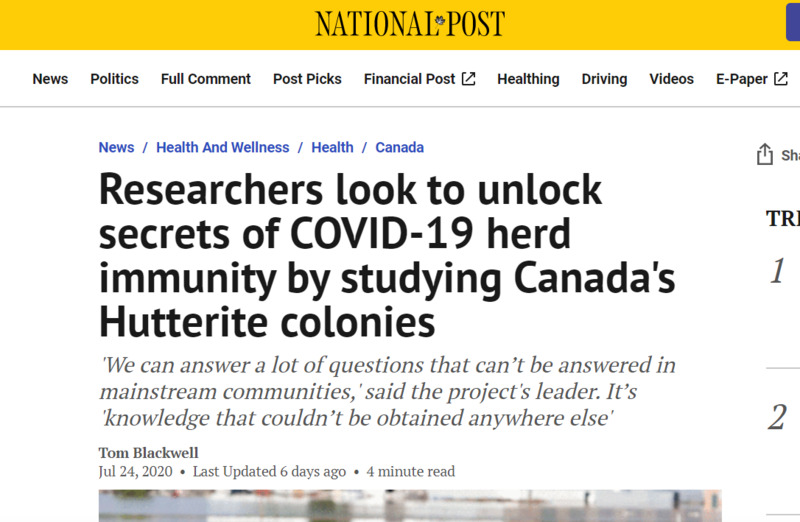 2020-07-24
2020-07-24Researchers look to unlock secrets of COVID-19 herd immunity by studying Canada's Hutterite colonies
"'We can answer a lot of questions (in Hutterite colonies) that can’t be answered in mainstream communities,' said Dr. Mark Loeb, a McMaster infectious disease professor who’s heading the project. It’s 'knowledge that couldn’t be obtained anywhere else.'" "The safety council chastised some members for visiting doctors without warning them they were sick, not observing social distancing and travelling outside their colony when it was not essential. Saskatchewan Premier Scott Moe said Wednesday the province may impose restrictions on travel to and from the colonies to curb spread of the coronavirus. But Moe also argued against stigmatizing the Hutterites, who have seen businesses indiscriminately barring members of the communities." -
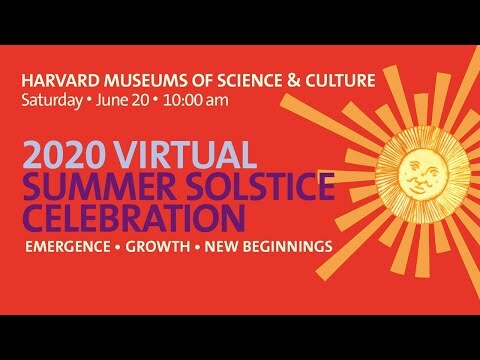 2020-06-20
2020-06-20Summer Solstice 2020 Virtual Celebration
Video virtual celebration of the Summer Solstice hosted by the Harvard Museums of Science and Culture. The video includes scientific and cultural presentations, as well as activities. Programming is drawn from the four museums that make up the Harvard Museums. As museums have been forced into online outreach because of the pandemic, they have had to change how they celebrate and commemorate important days and events. -
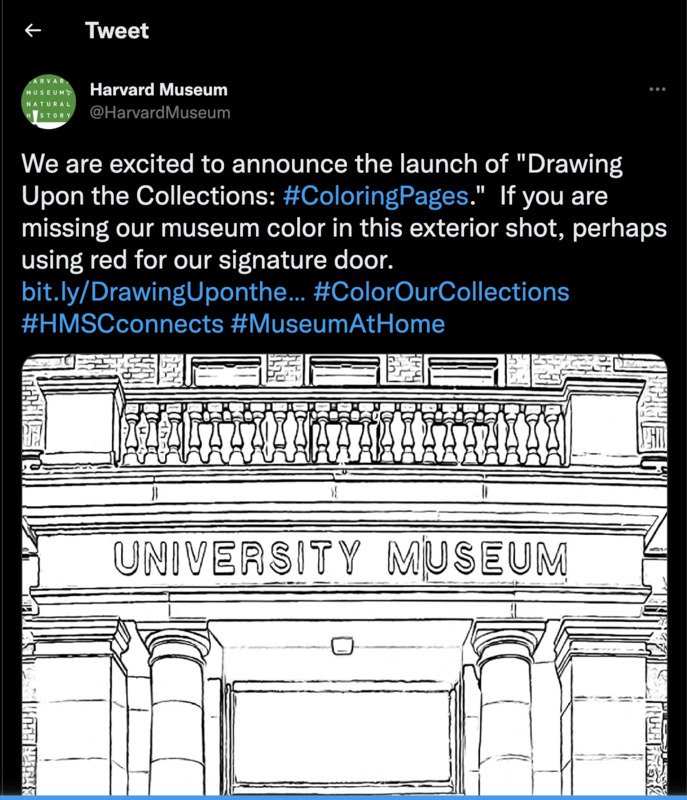 2020-06-09
2020-06-09Harvard Museum of Natural History #MuseumAtHome
Coloring page for the exterior of the Harvard Museum of Natural History published on their Twitter page as part of the social media campaign #MuseumAtHome. This is also tied to their #ColorOurCollections social media campaign. Both campaigns are part of Boston museums' efforts to engage in socially distanced outreach as a result of the CoVid-19 pandemic.
